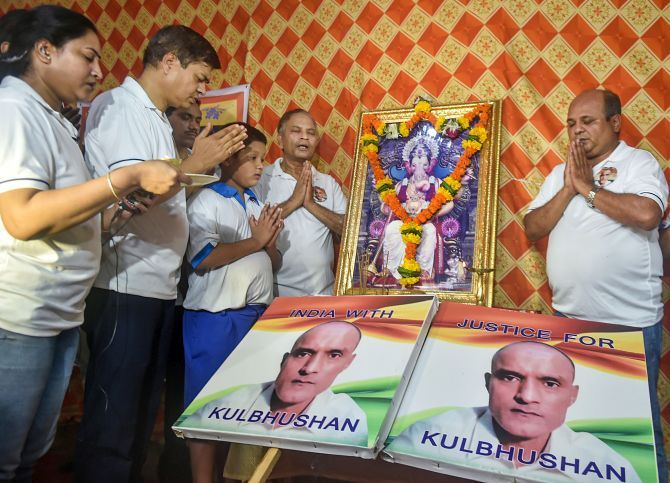'If the series of instances in the recent past are taken into account -- guns falling silent on the border; vastly reduced cross-border infiltration into J&K; positive approach to meeting Indian demands on the Kartarpur Sahib pilgrimage; resumption of overflight for Indian aircraft; visible disinterest in rhetoric and so on -- Commander Jadhav may see better days in a conceivable future,' notes Ambassador M K Bhadrakumar.

External Affairs Minister S Jaishankar's statement in Parliament on July 18 regarding the International Court of Justice judgment on Kulbhushan Jadhav -- he called it 'certain important development' -- was noteworthy for its sobriety of thought and restraint in language.
The EAM characterised the judgment as not only a vindication for India and Commander Jadhav, but for all those who believe in the rule of law and the sanctity of the international conventions.
He went on to welcome the 'landmark judgment'. In essence, the EAM has joined the two prime ministers Narendra Damodardas Modi and Imran Khan in underscoring the rule of law.
The EAM overlooked that India's plea to the ICJ had sought annulment of the Pakistani military court's decision convicting Commander Jadhav, his release and safe passage to India. The EAM sidestepped that the ICJ rejected these remedies sought by India.
Instead, the EAM highlighted that the ICJ asserted unanimously that it had jurisdiction in the case and pronounced that Pakistan did not handle the trial appropriately.
Specifically, Pakistan breached the provisions of the Vienna Convention by failing to notify India in real time about Commander Jadhav's detention.
Pakistan denied India consular access to Commander Jadhav.
The EAM recapitulated that the ICJ declared in its verdict that:
Pakistan is under an obligation to inform Commander Jadhav without further delay of his rights and to provide India consular access to him.
It is for Pakistan to make amends 'by means of its own choosing review and reconsideration of the conviction and sentence' of Commander Jadhav.
The review and reconsideration of the conviction and sentence must be effective.
Meanwhile, the stay of Commander Jadhav's execution continues.
Pakistan, in turn, has promptly acted on the ICJ verdict, stating that: Pakistan will grant consular access to Commander Jadhav for which modalities are being worked out. Commander Jadhav had been informed of his rights under the Vienna Convention on consular relations.
The EAM's statement is of a piece with the tweets by the two prime ministers -- conspicuously eschewing any triumphalism.
PM Modi had noted: 'We welcome today's verdict in the @CIJ_ICJ. Truth and justice have prevailed. Congratulations to the ICJ for a verdict based on extensive study of facts. I am sure Kulbhushan Jadhav will get justice. Our Government will always work for the safety and welfare of every Indian.'
PM Imran Khan noted the next day, first thing in the morning of 18/7: 'Appreciate ICJ's decision not to acquit, release & return Commander Kulbhushan Jadhav to India. He is guilty of crimes against the people of Pakistan. Pakistan shall proceed further as per law.'
The Indian media, which took the spin by unnamed government sources and crowed about an Indian 'victory' at the Hague, looks rather moronic. The EAM amply hinted that a long haul lies ahead, and India might as well use the bilateral channel to ensure Commander Jadhav's 'early return to India'.
Attention now turns to the choice that Pakistan is entitled to make -- whether there should be a re-trial by a military court or a civil trial. There is a good possibility that Pakistan will make the latter choice.
In the final analysis, this is a political call. India took the step of approaching the ICJ since the bilateral channel between Islamabad and New Delhi had got clogged due to rising tensions.
Besides, India and Pakistan have not had the maturity to evolve a rational system to properly handle such cases of alleged spies, away from the limelight, as the former Soviet Union and the United States had -- or, how Washington and Tehran often negotiated via intermediaries to get the release of alleged American spies detained in Iran.
Now, one must be incredibly idiotic to imagine Commander Jadhav risks execution in Pakistan. The real issue is how early he could return or he'd spend the best years of his life languishing in a Pakistani prison.
Much depends on the climate of India-Pakistan relations.
If the series of instances in the recent past are taken into account -- guns falling silent on the border; vastly reduced cross-border infiltration into J&K; positive approach to meeting Indian demands on the Kartarpur Sahib pilgrimage; resumption of overflight for Indian aircraft; visible disinterest in rhetoric and so on -- Commander Jadhav may see better days in a conceivable future.
Frankly, an uneasy feeling wells up at times that some elements within the Indian establishment might prefer if the status quo continued. But I sincerely hope Commander Jadhav returns to his homeland and his family -- and we also can, hopefully, get to know what really happened, from his point of view.
Was Commander Jadhav really one of the crème de la crème of the officer corps in the Indian Navy? If so, how come he ended up in the desolate eastern Iranian city of Chabahar on the Pakistani border? What did he do for a living?
Most important, should we hold anyone back in India accountable, too -- in a civil trial, of course? After all, as Hamlet in William Shakespeare's play put it, 'There's a special providence in the fall of a sparrow... God controls everything -- even something as trivial as a sparrow's death.'










